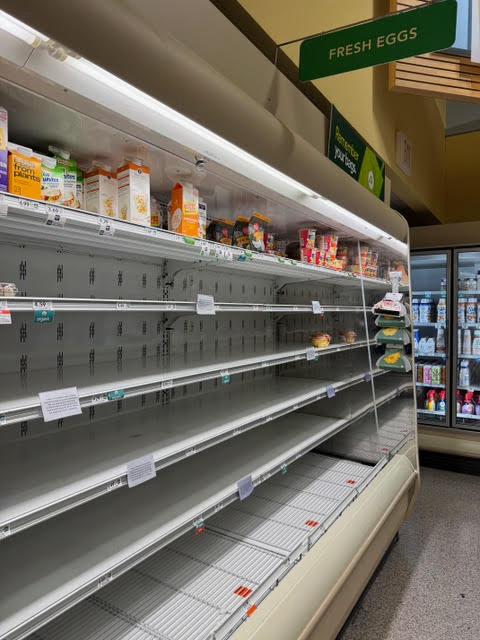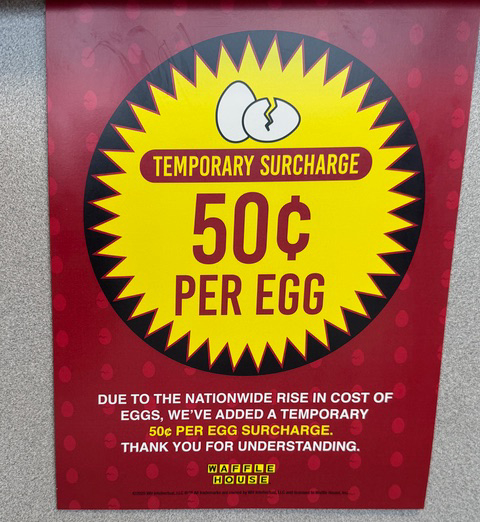Never thought “egg on your face” would be a sign of conspicuous wealth, but egg prices have risen to the point that egg “yolks” are comedic staples. Jokes about eggs are cheaper than the eggs themselves.
The reason’s simple; the solution’s not. To prevent the spread of avian flu, America’s poultry producers have been killing their flocks. In November and December, poultry farmers killed more than 17-million egg laying hens.
No hens. No eggs. No eggs and supply-and-demand makes eggs far more valuable than before the virus.
The American Egg Board says it’s a simple chicken-and-egg problem. Until there are no detections, the “very, very tight egg supply will continue.”
Egg prices were up more than 36% year-over-year in December according to the Consumer Price Index. Just under six weeks later, grocers are referring to those prices as “the good old days.”

According to the Bureau of Labor Statistics, a dozen egg carton of Grade A eggs hit a national average of $4.95 in January. In the groceries here, $5/dozen prices would kick off a stampede. As my Friday afternoon photo shows, it’s becoming increasingly rare to find eggs at any price in our local groceries. Those shelves were still bare yesterday.
Egg prices have nearly doubled since the sky-high prices we complained about in January. Today, the average cost of a dozen eggs now sitting at $8/dozen. And officials say barring something changing, we’ll be looking at another 20% increase before the end of the year.

It’s not just consumers who are feeling the bite. Egg prices are leading price increases for everything from Waffle House omelets to baked goods. Breakfast-centric restaurants are saying their bills for eggs are now topping $3,000 per week.
Waffle House serves approximately 272 million eggs per year. If their twenty-five to fifty-cent surcharge remains in effect for all of 2025, that means diners will have paid between $68 and $136 million dollars extra just for eggs.
Looking at instacart.com yesterday afternoon, a 60-count carton of Kroger’s Large White Eggs was priced at $24.99; just under 42-cents per egg -or $5.04/dozen. They’re also out of stock. Costco, Sam’s Club and wholesale clubs are limiting egg purchases.
How bad is it? Newly confirmed Agriculture Secretary Brooke Rollins says her first briefing after taking her oath of office was on bird flu. “We are looking at every possible scenario to ensure that we are doing everything we can in a safe, secure manner,” she said, “but also to ensure that Americans have the food that they need.”
With the egg shortages expected to continue, one import that likely won’t be impacted by threatened tariffs will be Turkish eggs.
According to the Egg Producers Central Union in Turkey, plans call for Turkey to import 420 million eggs to the U.S. this year. That, Union officials say, is an “all time high.”
For the record, Turkey is only the fourth largest egg exporter worldwide. Before bird flu, the United States was the second largest, trailing only the Netherlands. Our lessened supplies mean yet another potential widening in our trade deficit.
And eggs aren’t the only food chewing at our collective wallets.
Beef prices are climbing, with no slowing in sight there, either.
The Ag Department’s estimate of January’s 86.7 million head of cattle and calves on U.S. farms represents the smallest inventory levels in the past 65 years. Like eggs, beef inventories dictate pricing.
Less (supply) means more (cost).
Beef producers say drought conditions and high supply prices are the reasons they’ve been decreasing herds for the past few years. Today, with their limited supplies, their remaining cattle have never been more valuable.
It doesn’t take an economics degree to understand that rising grocery prices mean other areas of your budget have to compensate. For many families, there’s very little meat left on their budgetary bones.
For those of us who are hunters or anglers and have freezers full of fish and/or wild game, we’re once again better protected from unexpected happenings than most city dwellers.
We’ll keep you posted.
— Jim Shepherd